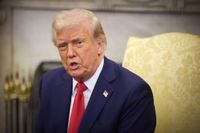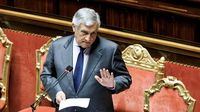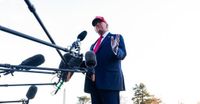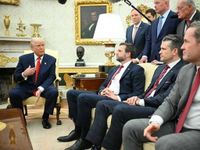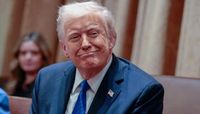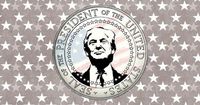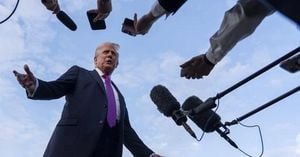In a shocking revelation, former President Donald Trump has accused Europe of being inhabited by "parasites" who have exploited the military protection of the United States. This incendiary comment came during a conversation with reporters at the White House, where Trump stated, "I think the Europeans are parasites," referencing the long-standing reliance of European nations on the U.S. military umbrella.
The controversy erupted following the accidental inclusion of a journalist from The Atlantic, Jeffrey Goldberg, in a secret chat on the messaging app Signal, utilized by senior White House officials. This chat, known as the "Houthi PC Small Group," included notable figures such as Vice President JD Vance, CIA Director John Ratcliffe, and Defense Secretary Pete Hegseth, among others. The group was discussing sensitive military plans regarding an ongoing conflict in Yemen, where U.S. forces had recently conducted airstrikes against Houthi rebels.
On March 15, 2025, the U.S. bombed Houthi positions, resulting in over 50 casualties, a fact that was revealed to the public shortly after the chat incident. The leak of this sensitive information raised significant concerns about national security protocols within the Trump administration.
During the chat, Vice President Vance expressed his frustration with the need to assist Europe, stating, "I can't stand having to save Europe again." His comments were echoed by Hegseth, who replied, "I fully share your hatred for the European parasite, it's pathetic." These remarks have sparked outrage across the Atlantic, particularly in the UK and Italy, where officials felt disrespected by the language used.
In response to the backlash, Trump doubled down on his support for Vance and Hegseth's comments, stating, "I agree, they are parasites. They have been for years, but I don't blame them, I blame Biden," referring to perceived failures in trade and tariffs under the current administration.
White House spokesperson Karoline Leavitt attempted to downplay the severity of the situation, asserting that no classified information was shared during the chat and that the inclusion of Goldberg was an unfortunate mistake. She noted that the legal office of the White House had provided a list of secure communication platforms for officials to use.
However, CIA Director Ratcliffe remarked that including a journalist in a chat discussing military operations was "obviously not appropriate." This sentiment was echoed during a Senate Intelligence Committee hearing, where Democratic Senator Michael Bennet pressed Ratcliffe on whether the CIA had followed its protocols regarding classified information. The hearing revealed a lack of clarity among intelligence officials about what had transpired in the chat, with many responding to questions with uncertainty.
In the wake of the incident, Italian Foreign Minister Antonio Tajani issued a strong statement, reminding U.S. officials that Italy protects its merchant vessels independently, having successfully intercepted Houthi drones targeting them. Tajani emphasized, "We protect our own merchant ships with our navy, and we will continue to do so." This statement served as a reminder of Italy's military capabilities and its commitment to safeguarding its interests.
As the fallout from this incident continues, it highlights the strained diplomatic relations between the U.S. and its European allies. The language used by Trump and his administration has raised alarms in Europe, leading to calls for a reassessment of U.S. foreign policy towards its allies.
Despite the growing controversy, Trump dismissed any notion of a serious security breach, stating that his administration's national security is stronger than ever. He described the chat leak as "the only snag in two months" and maintained that no significant harm was done to U.S. military operations.
As the situation develops, it remains to be seen how European leaders will respond to Trump's remarks and whether this incident will have lasting implications for transatlantic relations. The potential for further diplomatic fallout looms large, as the U.S. administration grapples with the consequences of its internal communications being made public.
In conclusion, the incident underscores the complexities of U.S.-European relations and the potential for misunderstandings to escalate into broader diplomatic crises. The language used by high-ranking officials reflects deeper tensions that could shape future interactions between the U.S. and its allies.
